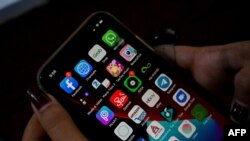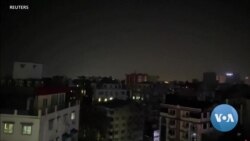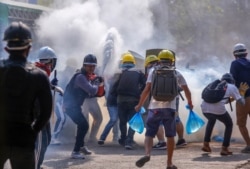For the past 24 nights, Myanmar residents have experienced the same pattern: The internet is mostly off, and then in the morning, it pops back on.
Then, tens of thousands of people in the country quickly jump on the Psiphon app and others that circumvent filters and blocks put up by the military government so they can reach popular sites such as Facebook, Twitter and others.
The nightly shutdowns are conducted by the Myanmar military government.
The internet wasn’t designed “to be turned off and turned on,” said Michael Hull, president of Psiphon, a circumvention tool like a virtual private network that allows users to go to sites without being detected. Psiphon works with news organizations such as VOA.
“You have to do a lot of work to pull that off,” he said.
Myanmar is just the most recent country to experience internet shutdowns. Throughout the world, governments are employing similar strategies during times of crisis.
In 2020, there were 155 internet shutdowns in 29 countries, according to Access Now, a digital rights group.
While that is fewer than shutdowns in the prior two years, blockages are used more for political control, said Raman Jit Singh Chima, Asia policy director and senior international counsel at Access Now.
India, with 109 shutdowns mostly in Indian-administered Kashmir,
had the highest number. In Belarus, the internet went down for 61 hours in August after the presidential election.
In addition to shutdowns, some governments are installing new censorship and surveillance capabilities on their networks. Cambodia is setting up an internet gateway to give the government the ability to surveil and censor internet users.
Governments typically argue that an internet shutdown helps maintain security in a time of crisis, including limiting the spread of misinformation. Some are looking to cybersecurity legislation to give the government more latitude to control the network, limit what people see and track people’s digital movements. Such moves raise serious concerns, Chima said.
“You need to be cautious about a cybersecurity move by any government,” he said, “because often, unfortunately, it has free expression and other human rights impacts.”
It is unclear why the Myanmar military government, which seized control on February 1, is conducting nightly internet shutdowns.
Theories include that the government is using the off-line period to install technology so it can more easily block, censor and track users when it powers the network back on. Another is that the military is using the period of limited communication both inside and outside the country to arrest people.
David Kaye, a former United Nations special rapporteur and a law professor at the University of California, Irvine, said he did not know why the military is shutting down the network, but it is troubling.
“The problem is that all the internet stuff is just a kind of prelude to something else,” he said. “Prelude to greater crackdown, harsher use of force, more detentions.”
Internet shutdowns come with economic costs — as much as $4 billion, according to a recent study by Top10VPN.
And there are political risks, particularly in nations that do not have diverse sources of information.
“They must really want to shut down the information flow because people rely on the internet in Myanmar,” Kaye said.







